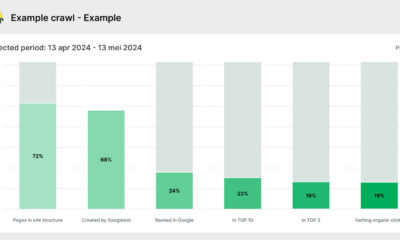MARKETING
How To Find Good Writers and Help Them Craft Great Content [Checklist]
![How To Find Good Writers and Help Them Craft Great Content [Checklist] How To Find Good Writers and Help Them Craft Great Content [Checklist]](https://articles.entireweb.com/wp-content/uploads/2022/06/1655374609_How-To-Find-Good-Writers-and-Help-Them-Craft-Great.png)
Updated June 16, 2022
When you finish this article, you will leave entirely and utterly convinced.
That’s every writer’s hope, right? Yet, a great deal of writing fails to convince anyone of anything because it’s poorly written, and that carries a tremendous cost.
Some rather dated studies put that cost around $400 billion. I imagine that number has only increased in recent years.
Why are marketers paying so much and wasting a lot of people’s time? Well, you may not have the right writer. Or you may be feeding the right writer garbage. Or perhaps it’s both.
Writers emit boring, derivative #content for two reasons: They aren’t the right writer, or they were fed garbage, says @cgillespie317 via @CMIContent. Click To Tweet
Finding the right writer
As the editor-in-chief at the writing and design studio Fenwick, I’m both a writer and an employer of writers. After six years of helping clients set up content operations, I am certain the responsibility for great writing lies with you, their employer. Many a promising writer was fired not because they lacked skill but because they were not provided the necessary materials to execute well. In some cases, they were assigned the wrong project.
The responsibility for great #writing lies with the employer, says @cgillespie317 via @CMIContent. Click To Tweet
Finding any suitable writer can be a slog. Almost every organization I talk to is in some phase of looking for a new or additional one, but the marketers have a difficult time finding prospects or gauging their skills.
Of the writers you’re likely to encounter, most will fall into three groups:
- Journalists– Trained to be precise, journalists are supposed to adhere to a code of ethics and be objective. This makes them excellent fact-checkers and concise writers, but they often abhor self-promotion and find the principles of marketing foreign. Writing content for marketing takes some adjustment.
- Copywriters– These are writers raised in the marketing world. They’re often bloggers. They understand web writing, headlines, SEO, and marketing and intuitively grasp what the business wants to accomplish. They have domain knowledge. But they sometimes lack the fact-checking, storytelling, and literary finesse of journalists.
- Creative writers– This category encapsulates people who write as an art and freelance for brands to merely fund their passion. They are screenwriters, comedians, essayists, playwrights, and novelists. I’ve never found one who cut it as a content writer. That’s not to say they can’t be found, but they are rare.
In my experience, you’re best off hiring a copywriter or journalist and teaching them about your industry. They already understand working under a deadline and anticipating readers’ questions. And they tend to know how to kill their darlings.
Your best #content bet? Hire a skilled writer and teach the domain knowledge they lack, says @cgillespie317 via @CMIContent. Click To Tweet
To refine your list, consider the trade-off between writing proficiency and subject expertise. These factors don’t have to be at odds, but they often are. Most writers either excel at their craft but know little about the topic, or they are middling writers well versed in the industry.
Which is better? That depends on how you plan to support them. If you can’t devote much time to rewriting, give more weight to writing proficiency. It’s probably better to have content that’s enjoyable and shared than dense and ignored. And you can always pair the writer with subject matter experts for interviews and gut checks, a la, “Hey, does this sound right?”
![How To Find Good Writers and Help Them Craft Great Content [Checklist] 1655374608 381 How To Find Good Writers and Help Them Craft Great](https://articles.entireweb.com/wp-content/uploads/2022/06/1655374608_381_How-To-Find-Good-Writers-and-Help-Them-Craft-Great.png)
This chart reflects that concept as the y-axis indicates writing proficiency and the x-axis is about subject matter expertise. Someone who is highly proficient with lesser expertise will create content people will read but not find very useful, while someone who is an expert but not a proficient writer will create useful content, but people won’t want to read it.
But if your content topics are highly technical or emotional in nature, it can be better to select a subject expert. Real expertise is tough to fake. Writers for an analytics software firm, for example, will struggle if they aren’t familiar with concepts like regression analysis.
Or if your organization markets to a tight-knit audience whose members share a common experience, such as sales leaders, an inexpert writer will quickly expose themselves. They’ll spend a lot of time writing about basic topics that beg questions nobody is asking, like “What’s the difference between sales and marketing?” Industry insiders quickly sense an impostor.
Where can you look for writers? Consider these four places:
- Referrals and word of mouth: Of all the options, referrals net the best results. As a rule, the best writers rarely look for work. They’re inundated with clients starving for their rare mixture of writing proficiency and industry expertise. The easiest way to find them is to ask around. You know you’ve found a quality one when they flip the interview around and ask you questions, are weirdly limited to one niche, and are already booked solid for the next few months.
- Content marketing platforms: Content marketplace platforms are pricier than other alternatives but potentially worth the cost. Platforms like Contently and Skyword curate their pool of writers and sometimes provide an editor (often a former news editor) who ensures top quality.
- Writer job boards: These forums connect writers and employers and include Problogger, Freelance Writers Den, Freelancers Union, Craigslist, or LinkedIn groups. Because they’re often lightly moderated, the quality of applicants varies widely. And because most boards cover all industries, it is difficult to find domain experts.
- Freelancing platforms: Sites like Upwork, Fiverr, and Freelancer.com promise to make matchmaking easier with automation. You can view the writers’ profiles, client reviews, and past work. But, with millions of freelancers, it takes a lot of dredging to find a fit.
To evaluate candidates, simply looking at their past work won’t do. According to Brad Hamilton, editor-in-chief of the investigative journalism nonprofit The Hatch Institute, “You can’t tell how good someone is based on something they’ve published – you never know, they might have had a fantastic editor.”
If you really want to save time in your evaluation, schedule a call and have them walk you through their samples to tell you how they got the story. Their ability or inability to explain will tell you a lot about what would come from them.
Finding the correct writer takes time. It is work. But unless you’re happy to spend money on content nobody will read, it’s worth it. Once you’re certain you have that writer, it’s your job to give them something worth writing about.
Once you’re certain you have that #writer, it’s your job to give them something worth writing about, says @cgillespie317 via @CMIContent. Click To Tweet
HANDPICKED RELATED CONTENT:
Supply your writer with substance
The first rule of content writing is GIGO – garbage in, garbage out. If you don’t supply your writer with substantive, thought-provoking material, they’re unlikely to invent it. It’s like casting a great actor in a movie with a rotten script.
The first rule of #content writing is GIGO – garbage in, garbage out, says @cgillespie317 via @CMIContent. Click To Tweet
I’ve talked with many marketers who have content created because, well, everyone else is. They think it’s simply a matter of filling a bucket with words. Sometimes they begin the conversation, “Will you need anything from me?” To a skilled writer, that’s a deeply worrisome thing to hear. It’s on you, the marketer, to understand your audience and what the content is supposed to achieve – and offer that as a foundation to the writer.
What can you give your writer to improve their writing?
6-step checklist to help your writers be better
- Buyer persona research: The more your writer can get inside your customer’s head, the more precise the writing will be. Personas based on real people, not composites, are best, and they should include first-person quotes.
- Access to your team: Most writers do better work when they feel included. Invite them to the office or to a virtual gathering to meet your team and set up ongoing opportunities for them to communicate with the team.
- Access to your customers: For all writers, the well of ideas eventually runs dry. Give them ways to get reinvigorated, such as interviewing It breaks them out of their pattern and gives you a never-ending fountain of fresh, authentic stories.
- Data: Content marketing writers rarely see data on how their content’s performance. Sure, they might see the number of shares, but they don’t get to track their engagement from piece to piece or A/B test headlines. Subscribe them to performance reports in your marketing system or Google Analytics.
- Feedback: Most writers never get more feedback than “thanks.” If they don’t know how they did, they can’t grow. Always track and share edits. Even better, build a style guide together. It’ll save you both a lot of time.
- Structure: If every deadline feels like an emergency, your content quality “I’ve never regretted waiting until the next day to publish,” says Caroline Vella, freelance content writer and editor. “I can’t say the same about rushing work through. Sleeping on it not only saves you from mistakes, but it also brings a fresh perspective.”
To provide structure to your writers, consider a project management tool like Notion (my personal favorite), Asana, or Airtable. Oh, and invest in a written content marketing strategy.
HANDPICKED RELATED CONTENT:
Stay involved throughout the writing process
It’s been a journey, so let’s recap. Have a writer? Have research? Have data? Have structure? Great. You’re halfway to effective writing. The next step? Remain heavily involved in the creation process if you want results.
Marketers I meet frequently want writers who run the content operation on their own. But it’ll be much more fruitful if you play the role of editor. It’s one thing to be creative and invent; it’s another to provide constructive criticism and play devil’s advocate. Rarely can one person do both, which means it takes a team of at least two.
If you entrust writers with the responsibility to do it all, you may develop a case of what the eminent psychologist and author of the book Influence Robert Cialdini calls the tapping problem.
In his test, one person thinks of a song in their head and taps out the tune on the table. The other person guesses the song’s name. Try this with a colleague. You’ll find the tapper is invariably frustrated with the guesser because they think the answer is beyond obvious. But it’s only obvious because they already hear the tune in their head.
Marketers who don’t offer clear briefs with suggested outcomes, quotes, links, and statistics to their writers are like Cialdini’s tappers. They shouldn’t be surprised when their writers create something different than what they had in mind.
HANDPICKED RELATED CONTENT:
Behind all great content is a great writer supplied with material
Great content doesn’t happen by accident. Neither does great writing. If you want to savor the fruits of content marketing, you must invest in finding and training the writers who ultimately determine its worth. For their part, writers need to see content creation as a partnership in which they receive substantive information to build from and feedback to improve.
When marketers are paired with the correct writers, magic happens. And that’s when you truly get high-performing content like this article, which hopefully leaves you convinced.
Please note: All tools mentioned are identified by the author. Feel free to include additional tools in the comments.
Cover image by Joseph Kalinowski/Content Marketing Institute



















You must be logged in to post a comment Login